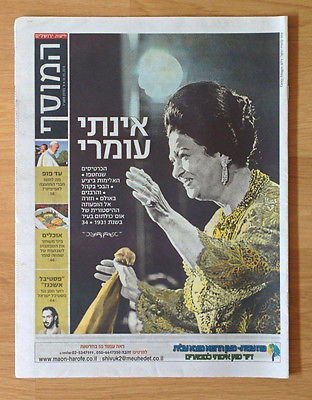Podcast: The Israeli passion for Arabic music
By Khaled Diab
Mizrahi Jews are reviving the Arabic music of their heritage and fusing it with new influences, which is proving popular with young Palestinians.

Thursday 31 March 2016
Like Cold War Moscow was for the West, Israel is the location for many an Arab spy thriller. So, by rights, my first visit, nearly a decade ago, should have been accompanied by suspenseful, high-tempo incidental music.
Instead, as I watched the Tel Aviv skyline whizz by in a blur from the taxi window, my ears were telling me I was in a Cairene ahwa, or traditional teahouse, not in Israel. The dulcet, glass-shattering, tones of Umm Kulthoum bombarded my eardrums.
“Enta omri,” “You are my life,” sang the taxi driver, undaunted by the enormity of the task of emulating the Arab world's most revered singer. His gravelly, tuneless voice, thickened by too many years of too much smoke, jarred painfully against the deep, husky mystery of Umm Kulthoum's own contralto voice.
Statistically speaking, of course, my surprise was unfounded, as I've discovered over four years of living here.
Although Israel's image abroad and the self-image it projects is very Western, about half of its Jewish population originates in the Middle East, but it is coy of showing this Arab face to the world.
Known as Mizrahi, or Eastern Jews in Hebrew, the first generation were born in Arab countries, the second generation grew up in Arabic-speaking households, and many in the third generation are busy rediscovering their roots.
The first generation had it tough. They fled their homelands out of fear following the creation of Israel, landed in desolate refugee camps and were usually sent off to remote “development towns” which never developed into anything beyond a receptacle for broken promises and shattered dreams.
Their Arab culture, which was also the culture of the enemy, was shunned and looked down upon by the Ashkenazi pioneers who founded Israel. This led the Mizrahim to seek escape from the offending Mizrahiness.
However, even if their culture was shunned in public, the Mizrahim maintained it in private, speaking Arabic at home and listening to the music they had grown up with. This was driven home to me by Murad, a oud player I met, who performed Arabic music at weddings and bar mitzvahs for the Iraqi community.
Despite having left his native Baghdad as a child, Mordechai, as he was known in Hebrew, had a large repertoire of Arabic songs, spoke fluent Baghdadi Arabic and had picked up the Palestinian dialect.
Some of the musicians who moved to Israel were among the crème de la crème of Arabic music, but found no interest from the Ashkenazi establishment. These included Daoud and Saleh al-Kuwaiti.
Born in Kuwait to an Iraqi-Jewish family, the Kuwaiti brothers were popular both with the political elite, including Iraq's then King Faisal, and the masses in Iraq and the Gulf, though they were expunged for decades from the Arab collective memory. In Israel, they fared no better. Saleh and Daoud were forced to eke out an existence as shopkeepers in Tel Aviv and sang in small bars.
Decades later, Daoud's grandson Dudu Tassa revived their memory by fusing their songs with the guitar riffs he had become famous for as a rocker. And Tassa is not alone. Recent years have seen Mizrahi music come out of the home and on to the radio, TV and the club scene. You can hear it at parties, weddings and even on Saturday nights at Mahane Yehuda, Jerusalem's covered market.
Numerous young artists have reclaimed the Iraqi, Yemeni and North African music of their ancestors, others have mixed it with other genres to create original new sounds. Some sing in the Arabic of their heritage, while others perform in the Hebrew of their present. There are Israeli artists who cover classics of Arab song or take the tunes and plonk Hebrew lyrics on them.
Despite the distrust of Israel and growing hatred towards Israelis in Palestinian society, Mizrahi music in Hebrew has a surprisingly strong following among young Palestinians, a trend which confounded a Palestinian artist friend who hears it all around the Bethlehem area. Even more bewildering, a trickle of Palestinian artists are singing Mizrahi music in Hebrew, such as Nasreen Qadri, who has found mainstream success.
While some Palestinian activists I know dismiss this interest in Mizrahi music as a form of assimilationism with the occupier and an expression of self-hatred, I think its causes run deeper. Despite their disparate politics, young Mizrahim and Palestinians have a lot in common: they are socioeconomically marginalised, their forebears were uprooted and their culture has been under threat.
As is the case with African-Americans, the fact that Mizrahi music has become hip and mainstream does not mean that the Mizrahim are no longer marginalised. Despite some success stories, the Israeli establishment and upper echelons are still firmly Ashkenazi.
This growing cultural pride has not translated into greater sympathy for Palestinians and Arabs. In fact, there has been a hardening of sentiment and a troubling surge in anti-Arab racism.
This is disheartening to Mizrahi activists I know who possess the dream that their communities' Arab roots can help bridge the gaping chasm separating Israelis and Palestinians.
This is unlikely to happen for many long years to come. But one day the Mizrahim and Palestinian appreciation for the same music may help them find the cultural common ground to hit the same notes politically and work in concert towards a better future.
____
Follow Khaled Diab on Twitter.
This report was first broadcast on the BBC World Service's The Cultural Frontline on 26 March 2016.

